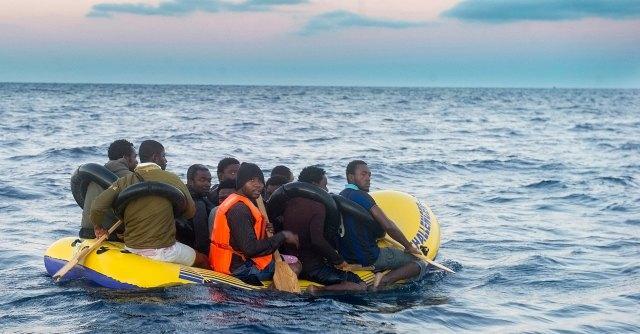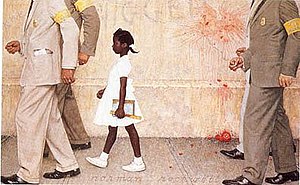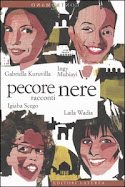Ruby Nell Bridges Hall (born September 8, 1954) is known as the first black child to attend an all-white elementary school in the South.
[1] She attended
William Frantz Elementary School at 3811 North Galvez Street, New Orleans, LA 70117.
[2][3]
Early life
Integration

William Frantz Elementary School building in 2010
In spring of 1960, Ruby Bridges was one of 6 black children in New Orleans to pass the test that determined whether or not the black children would go to the all white school. She went to a school by herself while the other 5 children went somewhere else. Six students were chosen; however, two students decided to stay at their old school, and three were transferred to Mcdonough. Ruby was the only one assigned to William Frantz. Her father was initially reluctant, but her mother felt strongly that the move was needed not only to give her own daughter a better education, but to "take this step forward ... for all African-American children." Her mother finally convinced her father to let her go to the school.
[4]The court-ordered first day of integrated schools in New Orleans, November 14, 1960, was commemorated by
Norman Rockwell in the painting
The Problem We All Live With.
[5] As Bridges describes it, "Driving up I could see the crowd, but living in New Orleans, I actually thought it was
Mardi Gras. There was a large crowd of people outside of the school. They were throwing things and shouting, and that sort of goes on in New Orleans at Mardi Gras."
[5] Former United States Deputy Marshal Charles Burks later recalled, "She showed a lot of courage. She never cried. She didn't whimper. She just marched along like a little soldier, and we're all very very proud of her."
[6]
As soon as Bridges entered the school, white parents pulled their own children out; all teachers refused to teach while a black child was enrolled. Only one person agreed to teach Ruby and that was
Barbara Henry, from
Boston,
Massachusetts, and for over a year Mrs. Henry taught her alone, "as if she were teaching a whole class." That first day, Bridges and her adult companions spent the entire day in the principal's office; the chaos of the school prevented their moving to the classroom until the second day. Every morning, as Bridges walked to school, one woman would threaten to poison her;
[7] because of this, the U.S. Marshals dispatched by
President Eisenhower, who were overseeing her safety, only allowed Ruby to eat food that she brought from home. Another woman at the school put a black baby doll in a wooden coffin and protested with it outside the school, a sight that Bridges Hall has said "scared me more than the nasty things people screamed at us." At her mother's suggestion, Bridges began to pray on the way to school, which she found provided protection from the comments yelled at her on the daily walks.
[8]
Child psychiatrist Robert Coles volunteered to provide counseling to Bridges during her first year at Frantz. He met with her weekly in the Bridges home, later writing a children's book,
The Story of Ruby Bridges, to acquaint other children with Bridges' story.
The Bridges family suffered for their decision to send her to William Frantz Elementary: her father lost his job,the grocery store the family shopped at would no longer let them shop there,and her grandparents, who were
sharecroppers in Mississippi, were turned off their land. She has noted that many others in the community both black and white showed support in a variety of ways. Some white families continued to send their children to Frantz despite the protests, a neighbor provided her father with a new job, and local people babysat, watched the house as protectors, and walked behind the federal marshals' car on the trips to school.
[5][9]
Adult life
Bridges, now Ruby Bridges Hall, still lives in New Orleans with her husband Malcolm Hall and their four sons.
[10] For 15 years Hall worked as a travel agent, later becoming a full-time parent. She is now chair of the Ruby Bridges Foundation, which she formed in 1999 to promote "the values of tolerance, respect, and appreciation of all differences". Describing the mission of the group, she says, "racism is a grown-up disease and we must stop using our children to spread it."
[11]
In 1993, Bridges Hall began looking after her recently orphaned nieces, then attending William Frantz Elementary as their aunt had before them. She began to volunteer as a parent liaison three days a week. Eventually, publicity related to Coles' book caused reporters to locate Bridges Hall and write stories about her volunteer work at the school, which in turn led to a reunion with her former teacher, Barbara Henry. Henry and Bridges Hall now sometimes make joint appearances in schools in connection with the Bridges Foundation.
[12]
Bridges Hall is the subject of the
Lori McKenna song "Ruby's Shoes." Her childhood struggle at William Frantz Elementary School was portrayed in the 1998 made-for-TV movie
Ruby Bridges. The young Ruby Bridges was portrayed by actress Chaz Monet, and the movie also featured
Lela Rochon as Ruby's mother, Lucille 'Lucy' Bridges;
Michael Beachas Ruby's father, Abon Bridges;
Penelope Ann Miller as Ruby's teacher, Mrs. Henry; and
Kevin Pollack as Dr. Robert Coles.
In November 2006 she was honored in the Anti-Defamation League's Concert Against Hate.

Bridges meets with President Obama and discusses her portrait on the wall.
In 2010, she had a 50th year reunion at Frantz Elementary with Pam Foreman Testroet, who, at age 5, was the first white child to break the boycott that ensued from Bridges' attendance at that school.
[2] Bridges continues to tour as an inspirational speaker against racism. In 2011, she visited St. Paul's Episcopal School, a K-8 school in Oakland, CA. Her visit coincided with the unveiling of the Remember Them humanitarian monument by Mario Chiodo, which includes a sculpture of the young Ruby Bridges.
On May 19, 2012 Bridges Hall received an Honorary Degree from Tulane University at the annual graduation ceremony at the Mercedes Benz Superdome.
References
- ^ The Unfinished Agenda of Brown v. Board of Education, p. 169
- ^ a b Miller, Michelle (2010-11-12). "Ruby Bridges, Rockwell Muse, Goes Back to School". CBS Evening News with Katie Couric (CBS Interactive Inc.). Retrieved 2010-11-13.
- ^ "Google Maps". Google Maps. Google Maps. Retrieved 2010-11-13.
- ^ Ruby Bridges Hall. "The Education of Ruby Nell," Guideposts, March 2000, pp. 3-4.
- ^ a b c Charlayne Hunter-Gault. "A Class of One: A Conversation with Ruby Bridges Hall," Online NewsHour, February 18, 1997
- ^ Susannah Abbey. Freedom Hero: Ruby Bridges
- ^ Excerpts from Through My Eyes, at African American World for Kids
- ^ Bridges Hall, Guideposts p. 4-5.
- ^ Bridges Hall, Guideposts p. 5.
- ^ "In a Class of Only One: Ruby Bridges". CBN.
- ^ The Ruby Bridges Foundation
- ^ Bridges Hall, Guideposts, p. 7.
- ^ "President Clinton Awards the Presidential Citizens Medals". Washington, D.C: The White House (whitehouse.gov), archived by the National Archives and Records Administration (nara.gov). 2001-01-08. Retrieved 2009-03-11.
Further reading
- Bridges Hall, Ruby. Through My Eyes, Scholastic Press, 1999. (ISBN 0590189239)
- Coles, Robert. The Story of Ruby Bridges, Scholastic Press, 1995. (ISBN 0590572814)
- Steinbeck, John. Travels with Charley in Search of America, Viking Adult, 1962. (ISBN 0670725080)
- The Unfinished Agenda of Brown v. Board of Education, John Wiley & Sons, 2004. (ISBN 0471649260)
External links




























